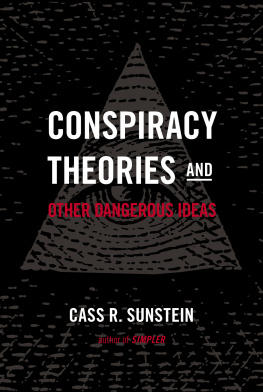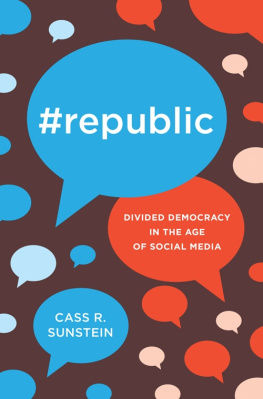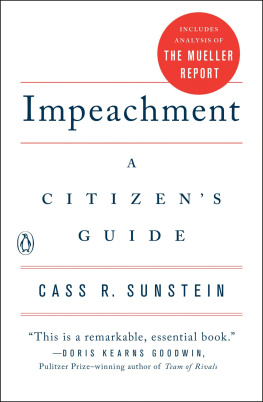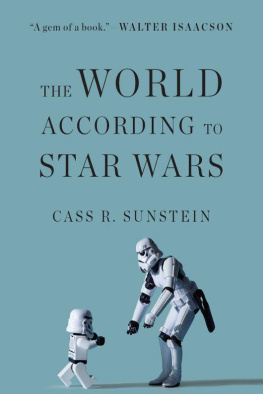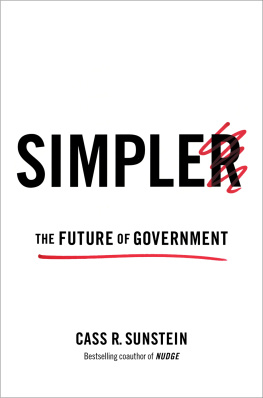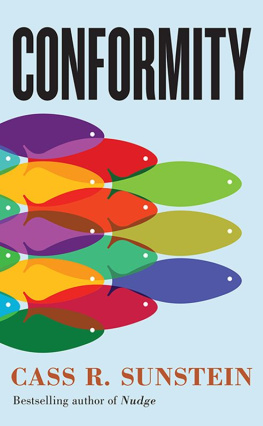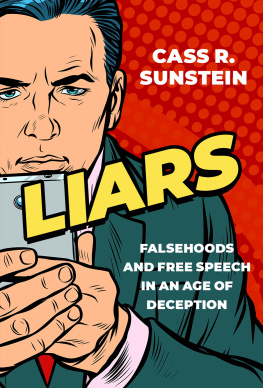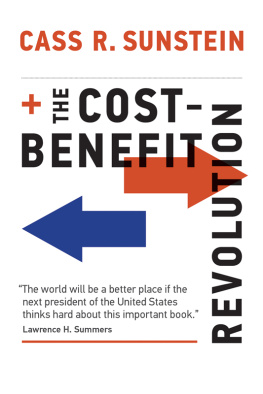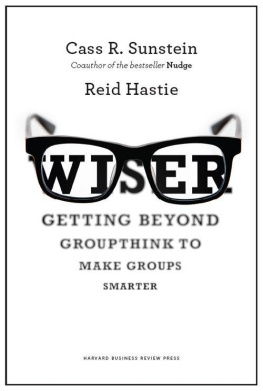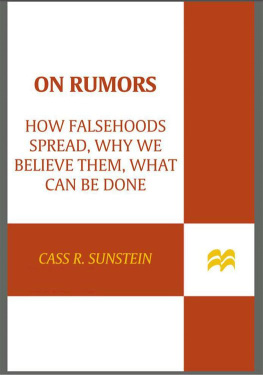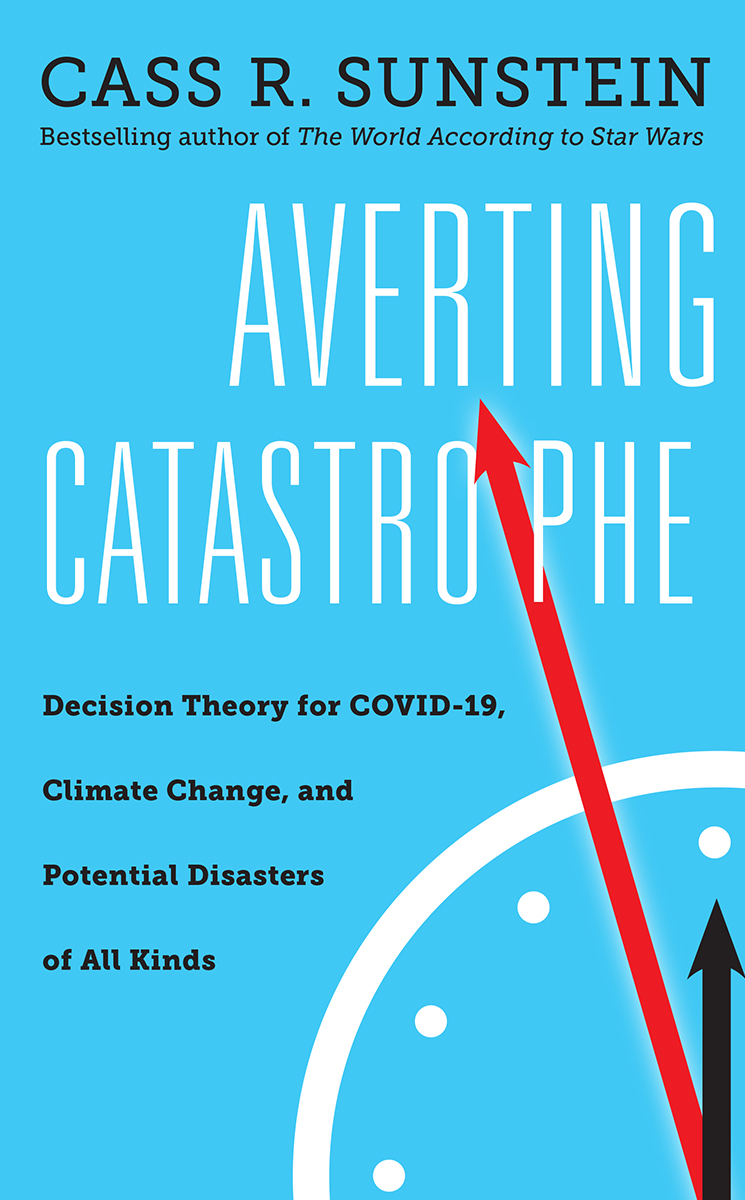
Averting Catastrophe
Averting Catastrophe
Decision Theory for COVID-19, Climate Change, and Potential Disasters of All Kinds
Cass R. Sunstein

NEW YORK UNIVERSITY PRESS
New York
NEW YORK UNIVERSITY PRESS
New York
www.nyupress.org
2021 by New York University
All rights reserved
References to Internet websites (URLs) were accurate at the time of writing. Neither the author nor New York University Press is responsible for URLs that may have expired or changed since the manuscript was prepared.
Library of Congress Cataloging-in-Publication Data
Names: Sunstein, Cass R., author.
Title: Averting catastrophe : decision theory for COVID-19, climate change, and potential disasters of all kinds / Cass R. Sunstein.
Description: New York : New York University Press, [2021] | Includes bibliographical references and index.
Identifiers: LCCN 2020049518 | ISBN 9781479808489 (hardback) | ISBN 9781479808502 (ebook) | ISBN 9781479808496 (ebook other)
Subjects: LCSH: Public administrationDecision making. | Crisis management in government. | Emergency management.
Classification: LCC JF1525.D4 S86 2021 | DDC 352.3/301dc23
LC record available at https://lccn.loc.gov/2020049518
New York University Press books are printed on acid-free paper, and their binding materials are chosen for strength and durability. We strive to use environmentally responsible suppliers and materials to the greatest extent possible in publishing our books.
Manufactured in the United States of America
10 9 8 7 6 5 4 3 2 1
Also available as an ebook
By uncertain knowledge, let me explain, I do not mean merely to distinguish what is known for certain from what is only probable. The game of roulette is not subject, in this sense, to uncertainty; nor is the prospect of a Victory bond being drawn. Or, again, the expectation of life is only slightly uncertain. Even the weather is only moderately uncertain. The sense in which I am using the term is that in which the prospect of a European war is uncertain, or the price of copper and the rate of interest twenty years hence, or the obsolescence of a new invention, or the position of private wealth-owners in the social system in 1970. About these matters there is no scientific basis on which to form any calculable probability whatever. We simply do not know.
John Maynard Keynes
Uncertainty must be taken in a sense radically distinct from the familiar notion of Risk, from which it has never been properly separated.... The essential fact is that risk means in some cases a quantity susceptible of measurement, while at other times it is something distinctly not of this character; and there are far-reaching and crucial differences in the bearings of the phenomena depending on which of the two is really present and operating.
Frank Knight
In some cases, the level of scientific uncertainty may be so large that you can only present discrete alternative scenarios without assessing the relative likelihood of each scenario quantitatively. For instance, in assessing the potential outcomes of an environmental effect, there may be a limited number of scientific studies with strongly divergent results. In such cases, you might present results from a range of plausible scenarios, together with any available information that might help in qualitatively determining which scenario is most likely to occur.
OMB Circular A-4
Contents
Appendix A: Memorandum for the Heads of Executive Departments and Agencies
This book has an unusual origin. Under President Barack Obama, I served as Administrator of the White House Office of Information and Regulatory Affairs, which oversees federal regulation in domains that include highway safety, health care, clean water, air travel, agriculture, occupational health, homeland security, clean air, and climate change. One of our tasks was to help develop a social cost of carbona number that reflects the economic damage of a ton of carbon emissions.
This was, and is, an exceedingly important number. Among other things, it helps determine the stringency of regulations designed to control greenhouse gas emissions from motor vehicles and power plants. It is fundamental to climate change policy. Working on the social cost of carbon, to produce a concrete number, may have been the most difficult task of my professional life. It was difficult in part because of the known unknowns, and the unknown unknowns, and the challenge of deciding how to handle them. In some respects, we were flying blind.
Dozens of people were involved; many of them were experts on science, economics, or both. They disagreed on fundamental issues. They disagreed vigorously about the magnitude of the harmful effects of greenhouse gas emissions. They disagreed about how much was known and how much was unknown. They disagreed about how to handle the possibility of catastrophe and whether to build in a large margin of error, which would produce a much higher number. We were able to reach agreement, but it took many months, and (to put it gently) not everyone who joined the agreement thought that the resulting number was the best choice.
My aim here is to connect some important questions in regulatory policy with some fundamental issues in decision theory. We have many illuminating treatments of regulatory policy, often focusing on social welfare, cost-benefit analysis, and distributive justice. We have a great deal of illuminating work in decision theory, focusing on risk and uncertainty, and also on how people actually handle challenging questions. Most of the time, those who focus on regulation do not engage decision theory, and vice versa. If we bring the two together, we should be able to make some progress in handling some of the most difficult problems of the current era, including those raised by pandemics, climate change, and others that we can only glimpse (and perhaps not even that).
My main goal is to explore how to think about averting catastrophe, understood as extreme downsides, making human life immeasurably worse. But we should also attend to the possibility of miracles, understood as extreme upsides, making human life immeasurably better. In reducing the risk of the former, we should try our best not to reduce the possibility of the latter.
Consider in this regard a passage from John Maynard Keynes, who lived through the Great Depression and World War II, who spent much of his young adulthood in same-sex relationships before he fell head over heels in love with a woman, and who knew a great deal about the unforeseeable:
By uncertain knowledge, let me explain, I do not mean merely to distinguish what is known for certain from what is only probable. The game of roulette is not subject, in this sense, to uncertainty; nor is the prospect of a Victory bond being drawn. Or, again, the expectation of life is only slightly uncertain. Even the weather is only moderately uncertain. The sense in which I am using the term is that in which the prospect of a European war is uncertain, or the price of copper and the rate of interest twenty years hence, or the obsolescence of a new invention, or the position of private wealth-owners in the social system in 1970. About these matters there is no scientific basis on which to form any calculable probability whatever. We simply do not know.
Keyness central claim is that some of the time, we cannot assign probabilities to imaginable outcomes. We simply do not know. Keynes immediately added, however, that the necessity for action and for decision compels us as practical men to do our best to overlook this awkward fact and to behave exactly as we should if we had behind us a good Benthamite calculation of a series of prospective advantages and disadvantages, each multiplied by its appropriate probability, waiting to be summed.
Next page

